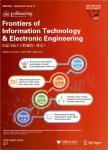Serial decoding of rateless code over noisy channels
Serial decoding of rateless code over noisy channels作者机构:Institute of Information and Communication Engineering Zhejiang University Hangzhou 310027 China Self-employed at Zhengyuan Xiaoqu 10-2-101 Hangzhou 310011 China
出 版 物:《Journal of Zhejiang University-Science C(Computers and Electronics)》 (浙江大学学报C辑(计算机与电子(英文版))
年 卷 期:2011年第12卷第10期
页 面:855-866页
核心收录:
学科分类:080902[工学-电路与系统] 0809[工学-电子科学与技术(可授工学、理学学位)] 08[工学] 081201[工学-计算机系统结构] 0812[工学-计算机科学与技术(可授工学、理学学位)]
基 金:Project supported by the National Basic Research Program (973) of China (Nos. 2009CB320405 and 2012CB316104) the National High-Tech R & D Program (863) of China (No. 2007AA01Z257) the National Natural Science Foundation of China (No. 60972057) the National Science & Technology Major Project of China (Nos. 2009ZX03003-004-03 and 2010ZX03003-003-01)
主 题:Rateless code Fountain codes Serial decoding Noisy channel
摘 要:Rateless code usually generates a potentially infinite number of coded packets at the encoder and collects enough packets at the decoder to ensure reliable recovery of multiple information *** conventional rateless decoder usually works in a parallel manner which needs to initiate a new belief propagation (BP) decoding procedure upon each newly received collection of coded packets,thereby resulting in prohibitive decoding complexity in *** this paper,we present a novel serial decoding algorithm,i.e.,the serial storage belief propagation (SS BP) algorithm,for rateless codes over noisy ***,upon receiving a new group of coded packets,the decoder initiates a new attempt to decode all the packets received so far,using the results of the previous attempt as initial ***,in each iteration of the new attempt,the decoder serially propagates the messages group by group from the most recent one to the earliest *** this way,the newly updated messages can be propagated faster,expediting the recovery of information *** addition,the proposed serial decoding algorithm has significantly lower complexity than the existing parallel decoding *** results validate its effectiveness in AWGN,Rayleigh,and Rician fading channels.




